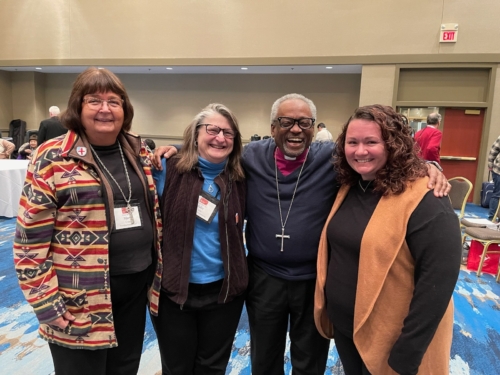
Bexley Seabury welcomed its most diverse group of students on Saturday, January 28, when faculty and staff joined twelve new students for the online orientation gathering of its new Mentor Assessed Path (MAP) Masters of Divinity (MDiv) Pilot Program. The students—seven Native-Americans, a Tongan, two people of European-descent who are working in Alaskan villages, a European-descent Mainer and a European-descent Minnesotan – are participating in the school’s entrée into what the Association of Theological Schools (ATS) calls competency-based theological education (CBTE).
CBTE is a paradigm shift in theological education that focuses on preparing students to demonstrate competencies in and for their own ministry contexts. Bexley Seabury, one of the first Episcopal seminaries to recognize the need for and to improve upon low or no-residency seminary education and formation, is one of the first mainline denominational seminaries and the first Episcopal Seminary to formalize CBTE as part of its graduate-level programs.
“The MAP program can revolutionize the way we educate and form church leaders, and it complements Bexley Seabury’s broad portfolio of distributive learning opportunities,” said the Rev. Dr. Micah Jackson, President of Bexley Seabury. “The Mentor Assessed Path to the MDiv continues to build our ‘seminary beyond walls’ continuum of theological education and formation that meets people where they are, in addition to preparing and credentialing them for what they feel called to do.”
The MAP MDiv upholds Bexley Seabury’s accredited program goals and learning outcomes while enabling students to develop a personalized learning plan with a team of faculty, denominational, and vocational mentors. Funded in part by two generous grants totaling $300,000 from Trinity Church Wall Street, MAP is designed to address two barriers to theological education: accessibility and cost. MAP eliminates constraints of time and significantly reduces the costs to earn a degree compared to traditional course-based models.
The Office of Indigenous Ministries of the Episcopal Church identified the lack of accessibility as a key reason there was only one Indigenous Episcopalian in an American seminary in 2020. The Rev. Dr. Mary Crist, Indigenous Theological Education Coordinator, has been directly involved in MAP’s design and development. “Soon after I began my work with the Office of Indigenous Ministries, I began working with Bexley Seabury to develop appropriate paths to prepare Indigenous leaders for lay leadership and ordained ministry,” Crist said. “Working with a mentor team will help students develop a customized plan that matches their learning style and vocational goals. I’m glad to be helping Bexley Seabury build on its history of providing theological education to Indigenous peoples.”
Currently enrolled MAP students will offer feedback and evaluation during the pilot program which will be incorporated into the full offering of the MAP MDiv option that will launch in the fall of 2024. This new pathway toward an MDiv will eventually empower a broad range of students to demonstrate the competencies required to earn an MDiv.
If you’re wondering how people in your diocese might benefit by partnering with Bexley Seabury through the MAP MDiv, we’d love to talk with you. Please contact jlytle@bexleyseabury.edu to learn more.
